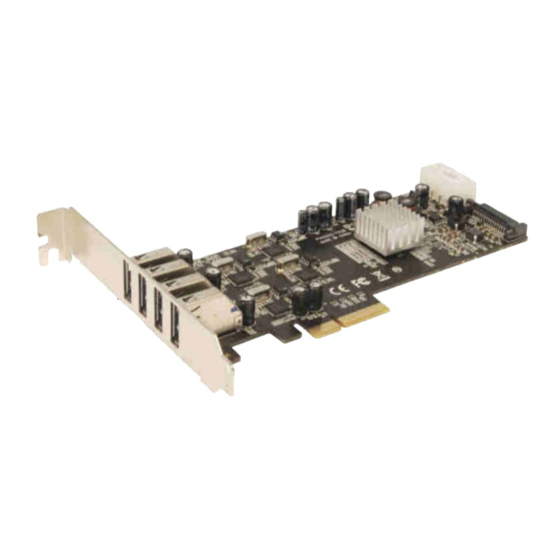
Werbung
Verfügbare Sprachen
Verfügbare Sprachen
Quicklinks
CONNECTORS
J1:
Pin
Assignment
Pin
Assignment
1
3.3 Volt (Orange)
7
5 Volt (pre-charge)
2
3.3 Volt (Orange)
8
5 Volt (Red)
3
3.3 Volt (pre-charge)
9
5 Volt (Red)
4
Ground (Black)
10
Ground (Black)
5
Ground (Black)
11
Reserve
6
Ground (Black)
12
Ground (Black)
For using the EX-11494-2 you must connect the card with the PC power supply. It must be
connected only one power connector J1 OR J2! Please make sure you connect the plug in the
right direction.
Never connect or release the plug while the PC is supplied with power!
J2:
For using the EX-11494-2 you must connect the card with
the PC power supply. It must be connected only one power
connector J1 OR J2! Please make sure you connect the plug
in the right direction.
Never connect or release the plug while the PC is
supplied with power!
1 +12V 2 GND
3 GND
4 +5V
HARDWARE INSTALLATION
Please note the following installation instructions. Because there are large differences between the
PC's, we can give you only a general installation instructions for the EX-11494-2. Please refer your
computer's reference manual whenever in doubt.
1.
Turn off the power to your computer and any other connected peripherals.
2.
Remove the mounting screws located at the rear and/or sides panels of your Computer and
gently slide the cover off.
3.
Locate an available PCI-Express expansion slot and insert the card. Make sure that the card
is plugged in correctly.
4.
Now install the power supply via the SATA 15 pin connector or the 4 pol molex connector.
(see picture Connectors J1 or J2)
5.
Then attach the card with a screw to the rear panel of the computer.
6.
Gently replace your computer's cover and the mounting screws.
5
DRIVER INSTALLATION
Windows XP/ Vista/ 7/ Server 2003 & 2008R2
After starting Windows is recognizes a new "USB (Universal Serial Bus)-Controller". Start the
„SETUP" file which is in the "uPD720201_202" folder (see picture):
Pin
Assignment
13
12 Volt (pre-charge)
14
12 Volt (Yellow)
15
12 Volt (Yellow)
Follow the installation instructions and complete the installation.
Windows will now install automatically you right driver for your particular operating system. After
the installation the operating system detects the card and automatically install them.
CHECK INSTALLED DRIVER
Open the >Device manager<. Now you should see at „USB-Controller" the following new entry's:
If you see this or a similar information the device is installed correctly.
Windows 8.x/ 10/ Server 2012R2
After the hardware installation, the operating system will recognize the device automatically and
install the drivers.
CHECK INSTALLED DRIVER
Open the >Device manager<. Now you should see at „USB-Controller" the following new entry's:
If you see this or a similar information the device is installed correctly.
AUFBAU
CN1-CN4:
4x USB 3.1 (Gen1)
A-Buchse für Endgeräte
BESCHREIBUNG & TECHNISCHE DATEN
Die EX-11494-2 ist eine USB 3.1 (Gen1) 4 Port Quad Channel PCI-Express Karte. Sie ist mit 4
externen Port's ausgestattet, die jeweils 900mA Strom zu Verfügung stellen. Sie unterstützt alle
PCI-Express Slots von x4 bis x16. Der serielle PCI-Express Bus unterstützt optimal die Leistung
des schnellen RENESAS Chipsatz. Zusätzlich besitzt jeder einzelne USB 3.1 (Gen1) Port einen
eigenen Chip und somit auch einen eigenen Channel. Die EX-11494-2 gewährleistet so eine
sichere Datenübertragung und exzellente Performance von bis zu 5Gbit pro Sekunde an jedem
Port! EX-11494-2 benötigt zusätzlichen Strom vom PC Netzteil, um die volle Leistung von
900mA an den 4 externen Port's zu gewährleisten.
Kompatibilität:
Betriebssysteme:
Anschlüsse:
Lieferumfang:
Zertifikate:
ANSCHLÜSSE
USB 3.1 (Gen1) A-Buchse:
6
EX-11494-2
Anleitung
Vers. 1.1 / 15.05.2019
J2:
4 Pin Molex Power
Anschluss vom
PC-Netzteil
PCI-Express x4 bis x16, USB 1.1, 2.0, 3.0 & 3.1
Windows XP/ Vista/ 7/ 8.x/ 10/Server 20xx/ Linux
4x USB 3.1(Gen1) A-Buchse, 1x 4 Pin Molex, 1x SATA 15 Pin
EX-11494-2, Low Profile Bügel, Treiber CD, Anleitung
GND_DR
StdB_SS
StdB_SS
StdB_SS
StdB_SS
Achtung!
Stecker niemals umgekehrt
oder mit Gewalt einstecken.
VCC
GND
D-
D+
1
J1:
SATA 15 Pin
Power Anschluss
vom PC-Netzteil
Werbung

Inhaltszusammenfassung für Exsys EX-11494-2
- Seite 1 Windows will now install automatically you right driver for your particular operating system. After the installation the operating system detects the card and automatically install them. For using the EX-11494-2 you must connect the card with the PC power supply. It must be CHECK INSTALLED DRIVER connected only one power connector J1 OR J2! Please make sure you connect the plug in the right direction.
- Seite 2 Achtung! Stecker nie bei eingeschaltetem PC ein oder ausstecken! The EX-11494-2 is a plug & play high-speed USB 3.1 (Gen1) 4 port quad channel PCI Express expansion card. The EX-11494-2 provides 4 external ports with 900mA power. The EX-11494-2 1 +12V 2 GND...













